Books
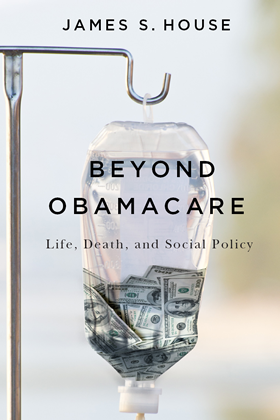 |
Beyond Obamacare: Life, Death, and Social PolicyHouse, James S. 2015. Beyond Obamacare: Life, Death, and Social Policy. New York, NY: Russell Sage Foundation. Health care spending in the United States today is approaching 20 percent of GDP, yet levels of U.S. population health have been declining for decades relative to other wealthy and even some developing nations. How is it possible that the U.S., which spends more than any other nation on health care and insurance, now has a population markedly less healthy than those of many other nations? Sociologist and public health expert James S. House analyzes this paradoxical crisis, offering surprising new explanations for how and why the U.S. has fallen into this trap. In Beyond Obamacare, House shows that health care reforms, including the Affordable Care Act, cannot resolve this crisis because they do not focus on the underlying causes for the nation�s poor health outcomes, which are largely social, economic, environmental, psychological, and behavioral. House demonstrates that the problems of our broken health care and insurance system are interconnected with our large and growing social disparities in education, income, and other conditions of life and work, and calls for a complete reorientation of how we think about health. He concludes that we need to move away from our misguided and almost exclusive focus on biomedical determinants of health, and to place more emphasis on addressing social, economic, and other inequalities. House�s review of the evidence suggests that the landmark Affordable Care Act of 2010, and even universal access to health care, are likely to yield only marginal improvements in population health or in reducing health care expenditures. In order to rein in spending and improve population health, we need to refocus health policy from the supply side--which makes more and presumably better health care available to more citizens�to the demand side�which would improve population health though means other than health care and insurance, thereby reducing need and spending for health care. House shows how policies that provide expanded educational opportunities, more and better jobs and income, reduced racial-ethnic discrimination and segregation, and improved neighborhood quality enhance population health and quality of life as well as help curb health spending. He recommends redirecting funds from inefficient supply-side health care measures toward broader social initiatives focused on education, income support, civil rights, housing and neighborhoods, and other reforms, which can be paid for from savings in expenditures for health care and insurance. A provocative reconceptualization of health in America, Beyond Obamacare looks past partisan debates to show how cost-efficient and effective health policies begin with more comprehensive social policy reforms. |
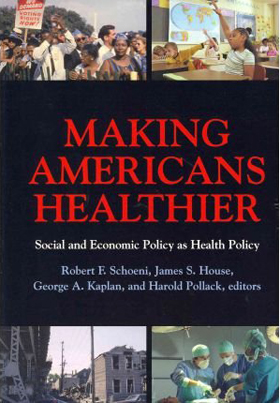 |
Making Americans Healthier: Social and Economic Policy as Health PolicySchoeni, Robert F., House, James S., Kaplan, George A., and Pollack, Harold (eds.) 2008. Making Americans Healthier: Social and Economic Policy as Health Policy. New York: Russell Sage Foundation. The United States spends billions of dollars annually on social and economic policies aimed at improving the lives of its citizens, but the health consequences associated with these policies are rarely considered. In Making Americans Healthier, a group of multidisciplinary experts shows how social and economic policies seemingly unrelated to medical well-being have dramatic consequences for the health of the American people Most previous research concerning problems with health and healthcare in the United States has focused narrowly on issues of medical care and insurance coverage, but Making Americans Healthier demonstrates the important health consequences that policymakers overlook in traditional cost-benefit evaluations of social policy. The contributors examine six critical policy areas: civil rights, education, income support, employment, welfare, and neighborhood and housing. Among the important findings in this book, David Cutler and Adriana Lleras-Muney document the robust relationship between educational attainment and health, and estimate that the health benefits of education may exceed even the well-documented financial returns of education. Pamela Herd, James House, and Robert Schoeni discover notable health benefits associated with the Supplemental Security Income Program, which provides financial support for elderly and disabled Americans. George Kaplan, Nalini Ranjit, and Sarah Burgard document a large and unanticipated improvement in the health of African-American women following the enactment of civil rights legislation in the 1960s. Making Americans Healthier presents ground-breaking evidence that the health impact of many social policies is substantial. The important findings in this book pave the way for promising new avenues for intervention and convincingly demonstrate that ultimately social and economic policy is health policy. |
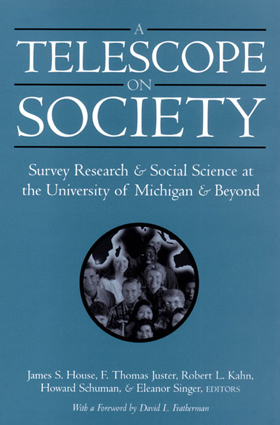 |
A Telescope on Society: Survey Research and Social Science at the University of Michigan and BeyondHouse, James S., Juster, F. Thomas, Kahn, Robert L., Schuman, Howard, and Singer, Eleanor (eds.) 2004. A Telescope on Society: Survey Research and Social Science at the University of Michigan and Beyond. Ann Arbor: The University of Michigan Press. A Telescope on Society seeks to convey the development of social science in the twentieth century through its interaction with a major new instrument for gathering data about society�survey research. The story of survey research and social science is largely told by social scientists affiliated with the Survey Research Center (SRC) and Institute for Social Research (IRS) at the University of Michigan about work done there. But the book also places this story in the broader context of survey-based social science in the United States and the world, to which many individuals and institutions beyond SRC, ISR, and Michigan have also contributed. The chapters of this volume illustrate the impact that developments in survey research have had and continue to have on a broad range of social science disciplines and interdisciplinary areas ranging from political behavior and electoral systems to macroeconomics and individual income dynamics, mental and physical health, human development and aging, and racial/ethnic diversity and relationships. The volume will speak to a wide audience of social science and survey research professionals and students interested in learning more about the broad history of survey-based social science and its contributions to understanding ourselves as social beings. It also seeks to convey how crucial institutional and public support are to the development of social science and survey research, as they have been to development in the natural, biomedical, and life sciences. |
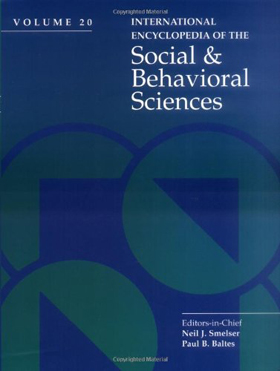 |
International Encyclopedia of the Social and Behavioral SciencesSmelser, Neil J., and Baltes, Paul B., (eds.) 2001. International Encyclopedia of the Social and Behavioral Sciences. Oxford, UK: Elsevier Science, Ltd. This Encyclopedia is the first attempt in a generation to map the social and behavioral sciences on a grand scale. Not since the publication in 1968 of the International Encyclopedia of the Social Sciences, edited by David L. Sills, has there been such an ambitious project to describe the state of the art in all the fields encompassed within the social and behavioral sciences. Available in both print (26 volumes) and online editions, it comprises 4,000 articles, commissioned by 52 Section Editors, and includes 90,000 bibliographic references as well as comprehensive name and subject indexes. "Like the pyramids, the work is monumental in scope, will prove to be enduring in its contribution, and is surely one of the great wonders of the scientific world." - Contemporary Psychology, APA Review of Books, 2004, Vol. 49, No. 6. "IESBS, a major social science reference work with a user-friendly interface.. Well worth the expense, even to libraries holding the print version..." CHOICE, November 2003 |
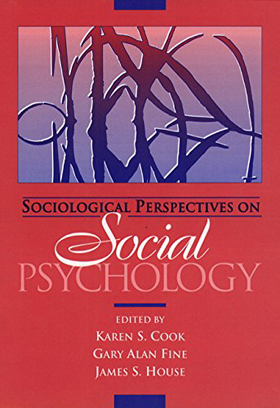 |
Sociological Perspectives on Social PsychologyCook, Karen S., Fine, Gary Alan, and House, James S. (eds.) 1995. Sociological Perspectives on Social Psychology. Boston: Allyn & Bacon. This book presents 29 original articles representing the state of the field of sociological social psychology. It covers a wide range of topics including cross-cultural social psychology, the study of gender and sex roles, biological social psychology, the philosophy of methodology, experimental research, non-experimental quantitative research, and qualitative research. |
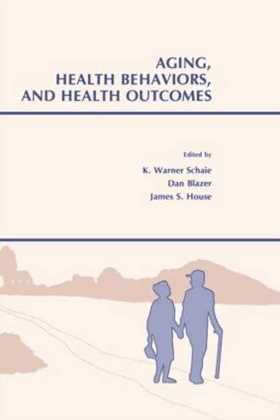 |
Aging, Health Behaviors, and Health OutcomesSchaie, K. Warner, Blazer, Dan, and House, James S. (eds.) 1992. Aging, Health Behaviors, and Health Outcomes. Hillsdale, NJ: Erlbaum. This volume is the fourth in a series designed to facilitate inter-disciplinary communication between scientists concerned with the description of societal phenomena and those investigating adult development. As such, it contains a compilation of papers presented at an annual conference held at the Pennsylvania State University. These essays by sociologists and epidemiologists deal with the impact of disease and health outcomes with advancing age and are critiqued by members of related disciplines. In addition, there are overviews as well as specific discussions about the impact of cancer, depression, and cardiovascular diseases upon psychosocial functions. |
 |
Work Stress and Social SupportHouse, James S. 1981. Work Stress and Social Support. Reading, MA: Addison-Wesley. Work Stress and Social Support begins by exploring the nature of social support, both in the workplace and outside it. Then it explores how and why social support may reduce occupational stress, improve health, and buffer the impact of stress on health. Finally it suggests ways to increase the availability of social support at work. This is the first book to provide a synthesis of what we know and a clear indication of what we still need to learn about the interrelation of social support, stress, and health. |




